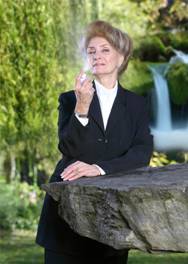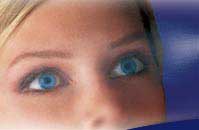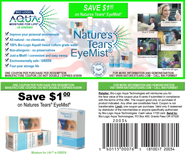
FOR IMMEDIATE RELEASE - October 13, 2011
Rogue Media
541-474-0950
Itching, Burning, Gritty or Scratchy Eyes
Are Dry Eye Symptoms
Latest Breakthrough Discoveries by Leading Dry Eye Experts
Sharon Kleyne Hour Power of Water interviews Laurie Barber MD: Ilene Gipson, MD; Robert Latkany, MD; Marguerite McDonald, MD; Philip Paden, MD; Rebecca Petris; and Alan Taylor, PhD
"Dry, red, itching, burning, gritty and/or scratchy eyes, and eye allergies, are common symptoms of dry eye syndrome, a dehydration disease that worldwide, represents a massive public health crisis that could lead to blindness. In the United States, dry eye symptoms are the #1 reason for eye doctor visits. The best way to avoid dry eye is to become educated on the subject."
Sharon Kleyne
Sharon Kleyne Hour Power of Water
Although dry eye symptoms constitute the number one complaint heard by eye doctors, the majority of people experiencing symptoms (which is nearly everyone) never go to the doctor. Only when symptoms interfere with their lives, do individuals seek medical advice. Whether you see the doctor or not, it is important to be aware that symptoms such as itching, burning, scratchy or gritty eyes, eye allergies, inability to tolerate contact lenses, and eye discomfort associated with computer use, could signal a potentially serious dry eye problem.

Sharon Kleyne, Founder of Bio-Logic Aqua Water Research and international water advocate, is announcing an increased emphasis on e-commerce and retail Internet accounts for Nature's Tears EyeMist, the company's patented, all-natural breakthrough product for dry eye, eye allergies and computer vision syndrome.
To Sharon Kleyne, host of the Sharon Kleyne Hour Power of Water talk show on World Talk Radio, Green Talk Network and Apple iTunes, there is more to itching eyes and burning eyes than meets the eye. Concerned about the global dry eye crisis, Sharon has conducted extensive personal research on dry eye, and dry eye is a frequent show topic (See websites, below).
"My show is about water and dehydration diseases and dry eye definitely qualifies," Mrs. Kleyne explains. "Dry eye's defining symptom is too little water in the eye's protective tear film. Dry eye almost always has multiple causes, the most important of which is a dry or polluted environment. Dry air, polluted air, forced air heating and cooling, insulated walls and windows and solar radiation all contribute to dry eye. Diet is also an important factor."
Mrs. Kleyne has interviewed several of the world's leading dry eye experts. "The goal is not to become a textbook," she explains. "We try to present real people talking about their own experiences in a way that anyone can understand."
A frequent show guest is Marguerite McDonald, MD, who performed the world's first laser eye surgery and frequently lectures on dry eye. She puts things in terms of her own experience. Her dry eye symptom list: "A need to go to bed earlier, difficulty reading, frequent anxiety and depression, increased eye allergies, fluctuating blurred vision and a sensation of dryness. Also, symptoms tend to be worse at the end of the day.
Another frequent guest is Robert Latkany, MD, an Ophthalmologist specializing in dry eye. He's written a book (The Dry Eye Remedy) and runs four dry eye clinics. According to Dr. Latkany, "Many diseases enter the body via the eyes. This is worse if the tear film is not healthy. Symptoms of an unhealthy tear film include intermittent blurred vision, itching and burning eyes, redness and irritation, drowsiness, anxiety and increased allergies."
Laurie Barber, MD, dry eye researcher at the University of Arkansas, offers this advice to listeners: "After age 35, we lose the ability to keep the tear film in top-notch condition without helping it along. That's why education - especially shows like this - is so important."
Philip Paden, MD, is an Ophthalmologist in Medford, Oregon and Medical Director at Bio-Logic Aqua Research. He notes that, "Our eyes are the same today as they were 100,000 years ago. However, the environment has changed drastically, especially the indoor environment." Dr. Paden advocates a vegan diet and agrees that diet is important to vision health.
Ilene Gipson, PhD, is a dry eye researcher at Harvard. She states that, "Two-thirds of dry eye patients are women and most are post-menopausal. She stresses that women do not automatically develop dry eye and that dry eye prevention requires education and attention to lifestyle, diet and fluctuating hormone levels."
Rebecca Petris operates www.dryeyezone.com, for individuals with severe, chronic and/or sight threatening dry eye. Those most likely to develop severe, chronic dry eye, according to Ms. Petris, include post-Lasik surgery patients, the elderly, contact lens users, individuals who have had cosmetic eyelid surgery and users of the acne drug Accutane.
Allen Taylor, PhD, is a researcher at Tufts University Laboratory for Nutrition and Vision. For eye health, he recommends for eye health and dry eye prevention, dark green leafy vegetables, omega-3 fatty acids, carrots, stress reduction, avoidance of sugar and "empty calories," 6 to 8 glasses of water a day and plenty of sleep and exercise.
Listen to the Sharon Kleyne Hour Power of Water Mondays, 10 a.m., PST/PDT. The syndicated talk radio show is heard on Voice America/World Talk Radio, Green Talk Network and Apple iTunes. See www.SharonKleyneHour.com for written summaries and replays of past shows. Visit www.naturestears.com, www.whatistheeye.wordpress.com, "Nature's Tears EyeMist" on Facebook and "Bio-Logic Aqua" on Twitter.
Appearance date:
- Rebecca Petris; 6-27-11 and 4-11-11
- Dr. Allen Taylor; 3-21-11
- Dr. Ilene Gipson; 6-7-10
- Dr. Marguerite McDonald; 10-19-09 and 6-1-08
- Dr. Laurie Barber; 8-18-08
- Dr. Philip Paden; 4-7-08
- Dr. Robert Latkany; 10-8-07 and 7-30-07
Since March, 2007, The Sharon Kleyne Hour Power of Water has done 23 segments related to dry eye and vision care. The show is sponsored by Bio-Logic Aqua Research® and Nature's Tears® EyeMist®.
© 2011 Bio-Logic Aqua Research









